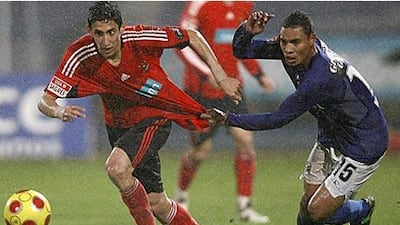Sometimes you just have to trust your gut and pull the trigger. In July 2007, Luis Filipe Vieira, the chairman of Benfica, flew to Canada to watch Angel Di Maria in the latter stage of the Under 20 World Cup. His scouts had already filed glowing reports on the young winger who had linked up well with Sergio Aguero to propel Argentina into the latter stages of the tournament. Vieira had reached a deal in principle to sign Di Maria, but, by the time he settled into his seat in Ottawa's Frank Clair stadium for Argentina's quarter-final against Mexico, he was not feeling quite so confident.
The winger's club Rosario Central informed him "half a dozen" other teams had entered the fray, among them FC Moscow, and the Russians were ready to break the bank. Vieira had a budget, he could only go so high, which is why he felt shocked and disappointed. Even after 20 years in football, it still hurt when a man's word was not his bond. Then something incredible happened. Maxi Moralez, a tiny attacking midfielder, stole the show. He scored the only goal but, more importantly, put on a masterclass of creativity and flair, wowing the crowd time and again. That night, when he returned to his hotel, Vieira received a text from Di Maria's representatives. FC Moscow had pulled out, they were going to sign this Moralez instead. Rosario were keen to do a deal, but it had to be done quickly. Vieira text back: "I'll be in the hotel lobby. How quickly can you get here?"
Within 10 days Di Maria was a Benfica player. Vieira spent US$8million (Dh29.3m) on him, with another $2.5m to come a year later. It was huge money for Benfica especially for an unproven 19-year-old from halfway around the world. But it certainly felt right and sometimes you have to roll the dice. Vieira's gamble paid off handsomely. After a few games for Benfica, Di Maria was already being compared to Simao, the local legend who had just been shipped off to Atletico Madrid. But Vieira was careful. He personally insisted that Di Maria be brought along slowly, the last thing they wanted was a case of burn-out. In his first two seasons, he made 25 league appearances off the bench, exactly the number of games he started. And yet those glimpses were enough for fans and media alike to realise he was special.
For a start, he did not have the prototypical winger's build. At around 6ft tall, he packed 75kg of muscle, giving him a natural sprinter's build. Together with the quick first-step, he boasted an astonishing amount of physical power - full-backs simply could not knock him off the ball. Even when he did meet a physical match, he usually got the best of it, thanks to his arsenal of feints, tricks and step-overs.
By last summer he was being linked to everyone from Real Madrid and Juventus to Chelsea, Arsenal and Manchester United. "He is the modern winger," said the Inter Milan manager Jose Mourinho, a verdict which amounts to an investiture. Because Di Maria is not just a sideline-hugging wide man who delivers crosses. He is at his best when he cuts inside, providing his team with a spare man and wreaking havoc in the middle of the park.
He has a natural knack for timing these diagonal runs perfectly, without unbalancing the side. "Players hate it when they see something different," Mourinho added. "Everything about Di Maria is different." Some see him as a modern-day Luis Figo, another winger who was about power first and foremost, and whose technical skills allowed him to be devastating when coming inside from wide areas. Not that Di Maria is perfect, as he is the first to admit.
He is not particularly good in the air, his range of passing is not great and he does not score very often. "I'm no Cristiano Ronaldo," he joked last year. "I can improve a lot, but I will never be like him." Maybe not. But that is a bit like saying your Porsche will never be a Lamborghini. Most of the time, if you need to get somewhere fast, the Porsche will more than do the job. And that explains why most of Europe's big clubs are knocking on Vieira's door.
gmarcotti@thenational.ae

